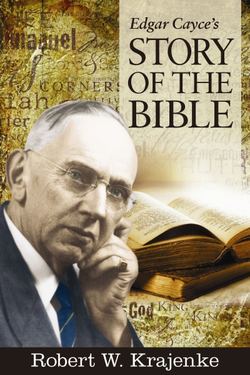Читать книгу Edgar Cayce's Story of the Bible - Robert W. Krajenke - Страница 51
На сайте Литреса книга снята с продажи.
Father Abraham
ОглавлениеAbraham, Isaac, and Jacob were the first patriarchs and set the examples. All the later prophets, seers, and writers of the Old Testament refer to the experiences of these three men. God spoke to Adam, walked with Enoch, and talked with Noah, but only with the coming of Abraham, Isaac, and Jacob did man’s concept of God become a personal thing.
On February 19, 1939, a fifty-four-year-old beauty salon manager obtained a Life reading. In this very touching extract from it, Cayce describes the influence Abraham and his family had upon her.
. . . the entity was in that land when there were those activities in which the chosen of the Lord, as recorded, were making for those activities which later brought about the dwellings of him called father of the faithful.
The entity then was among the daughters of Heth from whom Abraham purchased the land near Socoh. [Genesis 23] The entity was acquainted with that patriarch, though—as considered in those days—of an unknown people; yet through the activities viewed by the entity as to same there was aroused that which brought a longing for a knowledge of a something of which the entity had heard.
For the manner in which Abraham, Isaac, and Sarah—and even Ishmael—were in the care of their own brought the love of a home; yet to the entity—as in the present—seeking rather the knowledge of that city not built with hands, but rather that eternal in the heart and soul of those.12
Hence we find again those abilities of ministering, of teaching—not as proclaiming but in living, and in the quietness of the conversation, being able to give that which awakens within the minds and hearts of others that search for that which the entity finds in its emblem—the lamb and the lotus, in purity that touches even to the lips of God.
1825-1
On May 2, 1935, a young writer was told of an early life and Abraham’s effect upon her:
. . . when there were the settlings of the land, when first the land of promise came to be a portion of Abraham’s or Abram’s and Sarai’s activity. The entity was then among the daughters of Heth, of those peoples in that land, in the name then Beloi, and was very closely associated with Sarah, Abraham, Lot, and those people that settled in those plains of Abraham. And the entity’s daughter became then the leading among those that made for the combinations of the peoples of Isaac’s son and those of the Canaanite land.
In the experience the entity gained, for it proclaimed many of those tenets or lessons or philosophies, or activities—as would be called in the present—as to establishing the relationships with individuals, and what became as the Creative Forces or that philosophy of life as pertaining to the Creative Energies as given out by Abraham during the period. The entity proclaimed same to the peoples roundabout, and made for the closer companionships with those first leaders of those people set apart for an activity in the earth.
846-2
A Jewish businessman was told when Abraham went out from Ur, he had accompanied him. A love of travel and adventure is a result of that experience.
. . . before this we find in the Promised Land to those peoples who came up from Ur, and the entity was among those who served that leader, ruler, or patriarch, and gave much and required much at the hand of those about the entity in that day. Then the name was Shouel, and the urge as is seen—the desire of travel, and the urge of profit in traffic, for this, as is seen, is the greater influence in the present experience in earth’s sojourn.
2855-1
A twenty-year-old stenographer was told that Abraham had had a decided influence upon her in an earlier incarnation as one of his grandchildren.
. . . the early portion of those activities with Abraham, known as the father of the faithful. And the entity then was acquainted with those activities, being the daughter of Ishmael-Temah by name. And, being associated and acquainted with those activities and influences, the entity was among those who brought many of the changes in the affairs and activities of the peoples during that experience.
The entity held to rather the tenets of Abraham, as well as the knowledge of the activities of Isaac.
1709-3
These readings spoke of the influence of Abraham upon others. The following suggests an influence which may have strengthened Abraham himself—his mother! On January 30, 1930, a fifty-three-year-old housewife, a Theosophist, was told that following a life in Egypt, in 12,500 B.C., she had incarnated in India.
The entity then was among those when there came the destruction of the peoples in the valleys by those who would make rule from the hills. The entity then [was] among those who were conquered in body, but not in mind—and little by little the entity, through that experience, brings to bear such influence, such a condition, as to bring the peoples who would become the rulers in accord with the mental and the spiritual builders of that land, and of the house came Abraham. In the name Terahe. Not the father, but the mother.
115-1
